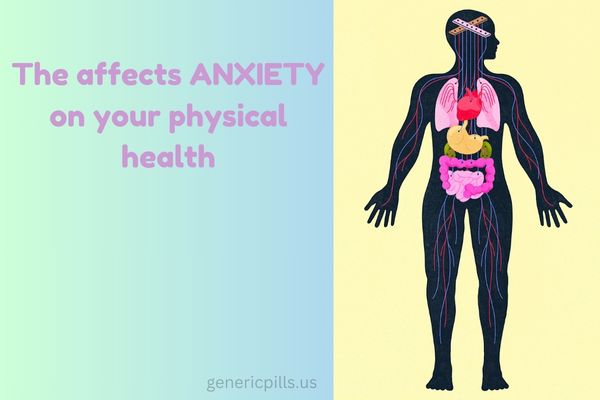5 Unexpected Ways Anxiety Affects Your Physical Health
Anxiety is, in the minds of most people, a mental condition, affecting your thoughts and emotions. In reality, this has far-flung implications for the physical health as well. The mental state, when anxiety strikes, does not stay in the mind but can cause havoc in many bodily functions which you may least expect.
Most people are aware of common anxiety symptoms, such as racing thoughts, rapid heartbeats, or shortness of breath. The physical effects of stress, however, can extend beyond these familiar signs. Stress is known to stimulate the release of stress hormones like cortisol in the body, and this impacts health over time.
What most people often do not realize is how these physicality effects can catch a person, presenting themselves as chronic conditions or symptoms that have no relation to anxiety. The hidden impact will also go on to affect your daily life, making it even harder to control the psychosomatic stress of anxiety itself.
For instance, anxiety has been associated with issues in the gastrointestinal tract, insomnia, chronic pain, and even heart conditions. Because these symptoms may not seem as typical for the condition, anxiety can be underdiagnosed or even diagnosed with the wrong condition at times.
In this blog post, we will explore 5 unexpected ways anxiety affects your physical health. Understanding how anxiety impacts your body can help you identify these signs early, allowing you to take proactive steps to manage both your mental and physical well-being. By addressing the underlying causes and symptoms of anxiety, you can start to improve your overall health and quality of life.
Understanding Anxiety: A Closer Look at the Condition

Managing anxiety effectively starts by understanding anxiety as a natural reaction to stress, characterized by feelings of fear, nervousness, or unease. The truth is, while it’s normal to be anxious in particular situations—before a big presentation or a significant life change—persistent or overwhelming anxiety can definitely interfere with daily life and one’s general welfare.
Anxiety can take all sorts of disguises, which may range from mild form unease through to full blown panic attacks, affecting both a person’s thinking and body – hence the multiple symptoms that encompass constant worry; racing thoughts that can’t help but be annoying, fatigue in addition to numerous physical reactions from rapid heartbeat or sweating to light-headedness.
Causes of anxiety. Anxiety can be a culmination of many factors, such as genetics: there are possible hereditary inclinations because of a family history of anxiety disorders. Experiences in life, particularly traumatic or stressful situations, may also contribute to the predisposition towards or exacerbation of anxiety. Another factor is being offset by imbalances in some brain chemicals, such as serotonin and dopamine.
Only after recognizing and understanding anxiety will the person manage it effectively. By using such strategies as relaxation techniques, therapy, and even medication in certain situations, the patient can deal with anxiety, hence controlling and keeping it within a manageable scope. Taking the time to learn about anxiety helps one take healing steps toward rebalancing his life and becoming calmer once more.
Causes of Anxiety: What You Need to Know

Anxiety is a complex disorder caused by several interacting factors. Most of the time, anxiety results from causes that are too many and intertwined, making it very hard to define a cause of anxiety. Identifying what makes you anxious and understanding why helps you handle anxiety better.
1. Stress is one of the commonest causes of anxiety. Everyday life stressors, like work pressure, relationship problems, or poverty conditions may cause prolonged stress that manifests anxiety. Severe accident, abuse, or loss of a dear one also causes long-lasting anxiety and may be associated with post-traumatic stress disorder (PTSD).
2. Another important cause is genetics. Anxiety disorders often seem to run in families, implying a genetic tendency to the condition. If your relatives have anxiety, you are more likely to develop it too.
3. Chemical imbalances in the brain, particularly those affecting neurotransmitters like serotonin and dopamine, may also contribute to anxiety. Such imbalances can impact mood regulation, making one feel anxious or fearful to an abnormal extent.
Finally, some conditions and medications bring about or may worsen the anxiety. Various health issues are heart disease and thyroid problems among others, but chronic pain contributes to anxiety in many patients as well as other medications that involve the nervous system.
Knowing this, it helps to address these causes of anxiety with specific therapies, lifestyle alterations, or medical management to regain the control and gain better mental conditions.
5 Ways Anxiety Affects Your Physical Health
Here are 5 unexpected ways anxiety affects your physical health:
1. Digestive Issues
The relationship of anxiety with the gut, popularly called the “second brain,” is deep. During fight-or-flight response, the digestive system may malfunction, causing one to feel bloated, nauseated, have acid reflux, and even experience diarrhea and constipation. The hormone cortisol also throws off the delicate balance of good bacteria in your gut, leading to a hypersensitivity to all digestive issues.
Tip: Mindful eating, relaxation techniques to manage stress, and gut-friendly foods such as yogurt and fiber-rich vegetables will help manage anxiety-related digestive discomfort.
2. Chronic Pain and Muscle Tension
Anxiety tends to stiffen your muscles as a reflex to stress. You may experience tension in the shoulders, neck, or back or even have tension headaches. As time goes by, this constant muscle contraction can contribute to chronic pain conditions such as fibromyalgia and exacerbate other pain problems. In extreme cases, anxiety can even lead to TMJ (temporomandibular joint disorder), which leads to jaw pain and difficulty chewing.
Tip: Regular stretching, yoga, and mindfulness meditation are good in loosening muscle tension and overall relaxation.
3. Weakened Immune System
Cortisol is released from the glands at the moment anxiety sets in; however, while useful for immediate responses to stressors in the short term, this means your cortisol levels stay up for much longer with chronic anxiety, weakening the immune system. You then tend to get more susceptible to infections and even a common cold or flu. Furthermore, anxiety tends to slow the rate of recovery if someone is suffering from illness or an injury.
Tip: Stress management techniques such as deep-breathing exercises or other forms of physical activity that promote relaxation can help regulate cortisol levels and maintain a healthy immune system.
4. Sleep Disruptions
It’s no secret that anxiety can make it difficult to sleep. Constant worrying, racing thoughts, and physical symptoms like a racing heart or shallow breathing often prevent restful sleep. Over time, poor sleep can affect your overall health, leading to decreased cognitive function, irritability, and an increased risk for other conditions like obesity and cardiovascular disease.
Tip: Develop a soothing bedtime routine that reduces use of electronic displays and other stimulating devices, includes the use of relaxation techniques, and provides a sleep-conducive environment. If sleep disturbances persist, seek professional healthcare advice.’
5. Heart Disease Potential
Although anxiety may increase heart rate in the short term, chronic anxiety may lead to more severe heart diseases in the long run. This condition of constant readiness for “fight or flight” puts additional stress on your cardiovascular system, increases the chance for high blood pressure, heart attack, and other cardiovascular issues. Again, anxiety contributes to unhealthy coping mechanisms such as overeating or smoking, which enhances heart disease.
Tip: Engage in aerobic exercises, maintain a healthy diet, and practice stress-reducing techniques such as mindfulness to be heart-healthy.
How Can Benzodiazepines Prevent Anxiety?

Anxiety is the most common of mental health issues, which becomes debilitating if left unmanaged. For some individuals, anxiety is overwhelming, and they may need a medical intervention in order to reduce their symptoms. One of the classes of medication that is very commonly prescribed in the treatment of anxiety is benzodiazepines. However, how does benzodiazepine help prevent anxiety and is it an appropriate solution for everyone?
Benzodiazepines, also known as “benzos,” are a class of drugs that include popular prescription drugs such as Valium (diazepam), Xanax (alprazolam), Ativan (lorazepam), and Klonopin (clonazepam). They are usually prescribed for short-term treatment of anxiety, panic disorders, and insomnia because they rapidly ease symptoms.
Benzodiazepines are effective in the short term to prevent anxiety, especially for people experiencing acute episodes or panic attacks. They enhance GABA activity in the brain, which has a calming effect on the nervous system. However, because of the potential for tolerance and dependence, they are prescribed for short durations and should be used under the supervision of a healthcare professional. For long-term anxiety management, alternative treatments such as therapy and antidepressants are often recommended to provide more sustainable relief.
Conclusion
In conclusion, understanding the surprising ways in which anxiety affects your physical health is key to taking a holistic approach to managing the condition. While mental symptoms are often at the forefront, the physical impacts of anxiety can be just as disruptive, from your digestion to your immune system. Recognizing these hidden consequences can help you take proactive steps to protect both your body and mind.
By addressing these physical symptoms early, you can prevent long-term health complications. Managing anxiety involves more than just calming your mind—it’s about fostering overall wellness. Whether it’s through exercise, therapy, or mindful practices, integrating strategies to reduce stress can improve both your mental and physical well-being.
Taking care of the body is almost as important as the mental aspects in anxiety. In fact, seeing your healthcare provider regularly and openly discussing the impact of anxiety on your body is one of the best ways to find effective treatments. Anxiety can be complex, but with the proper tools and support, you’ll be able to navigate its effects to live a healthier, more balanced life.
Remember, anxiety is not who you are or how you are. Instead, by keeping your mental health and physical health in check, you can escape the vicious cycle of anxiety and regain your life.























